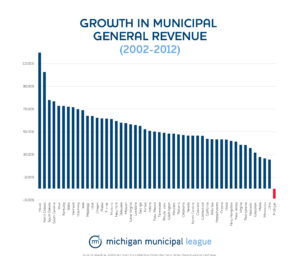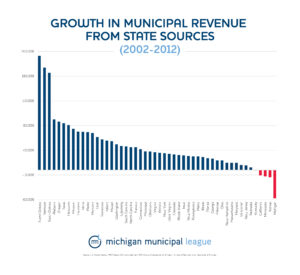
The League’s Anthony Minghine discusses revenue sharing during the news conference Monday afternoon.
How bad is the municipal finance situation in Michigan? It’s the worse in the nation over the last decade, according to new data unveiled at a Michigan Municipal League news conference Monday, March 21.
And the culprit? State policies and politicians who have ignored the needs of cities, in the process damaging the state’s overall economy.
U.S. Census data shows Michigan is the ONLY state in the nation where municipal revenues overall declined from 2002-12 (the most recent information available).
Across the state, municipal revenues were down by 8.63 percent over that period, led by a 56 percent reduction in state revenue sharing.
Meanwhile, overall state revenues increased 39 percent. The numbers show that the state balanced its budget on the backs of cities.
The successful news conference was covered by multiple news outlets and also was live-streamed.

You can see all the details at SaveMICity.org, a new web site the Michigan Municipal League has set up to provide information about the severity of the municipal finance problem facing Michigan, and offer solutions over time.
The website also has a new data base showing the revenue sharing dollar amounts diverted from every community in the state from 2002 to 2015.
More than $7.5 billion has been diverted statewide in that time period. Look up your community’s information here.

One of the many charts showing how Michigan has disinvested in its cities more than any other state in the state. That tiny red line you see is Michigan.
“Our cities are facing desperate conditions,” said League CEO and Executive Director Dan Gilmartin.
And he pointed to “fundamentally flawed” state policies providing for municipal finance, including massive cuts in revenue sharing since 2002, limits on assessment increases, but none on decreases, and other punitive state policy decisions.
Across America, the statewide average increase in municipal revenues was more than 40 percent.
The state with the next worse municipal finance revenue growth was Ohio, and there revenue grew by 25.7 percent. Around the nation, the average increase was more than 40 percent.
League Associate Executive Director and COO Tony Minghine has been leading a task force of League members and staff in examining the situation and brainstorming solutions. Minghine explained at the news conference that state policies have led to “strategic disinvestment” by cities, as they struggle to balance budgets in the face of declining revenues. He asked rhetorically whether Flint might have been able to avoid its man-made water contamination catastrophe if it had received the $63 million in revenue sharing withheld by the state since 2002 as a part of state budget balancing.
Minghine said more revenue is just one part of the League’s plan to be laid out in coming months, to try to address the pressing situation. He said cities will ask for legislative approval to address cost issues and look at the structure of local services in ways that are today prohibited by state law.

Another chart showing how Michigan has disinvested in its cities more than any other state in the state.
Wayne Mayor Susan Rowe showed how the situation is facing her city, which has seen revenue sharing cut by a cumulative $7.8 million since 2002 and has lost millions more in tax base due to decisions made at the state level regarding assessment practices. Wayne has laid off half its police force and still will run out of money in 2017. “We need the state to keep its promises to cities,” she said.
Mitch Bean of the Michigan Economic Consulting Group minced no words in putting the current plight of many cities on state policies. He pointed out that the combination of the Headlee Amendment to the state constitution and Proposal A allow assessments to drop during hard times, but limit their growth during good times. As a result, even a relatively well-off community like Farmington Hills, which saw assessments drop 30 percent from 2008 to 2012, will likely not see its tax base return to 2008 levels until 2025.
Why should state policymakers care about what they are doing to cities? Shanna Draheim of Public Sector Consultants, which has prepared a new report “Creating 21st Century Communities, Making the Economic Case for Place” said the result of these state decisions is that Michigan cities are lagging successful communities in attracting new talent. And that means the state is lagging in that vital category. You can see it in state personal income data, where Michigan has gone from a top 15 state to a bottom 15 state in per capita income since 2000.

Speakers during Monday’s Michigan Municipal League press conference in Lansing. From left, Mitch Bean, Wayne Mayor Susan Rowe, Eric Lupher, Anthony Minghine and Dan Gilmartin.
“States that have invested in cities are doing the best. They are growing economically. Michigan has the opportunity to do the same,” said Draheim.
But not unless we make some major changes to the state’s municipal finance policies, in a way that will let cities create the safe, walkable, fun locations that people want to move to. Until that happens, all of Michigan will suffer as the state’s economy sputters and fails to provide the public goods and economic opportunities that benefit all of us, whether we live in a big city, or rural township.
Matt Bach is director of media relations at the Michigan Municipal League. He can be reached at [email protected] and (734) 669-6317.